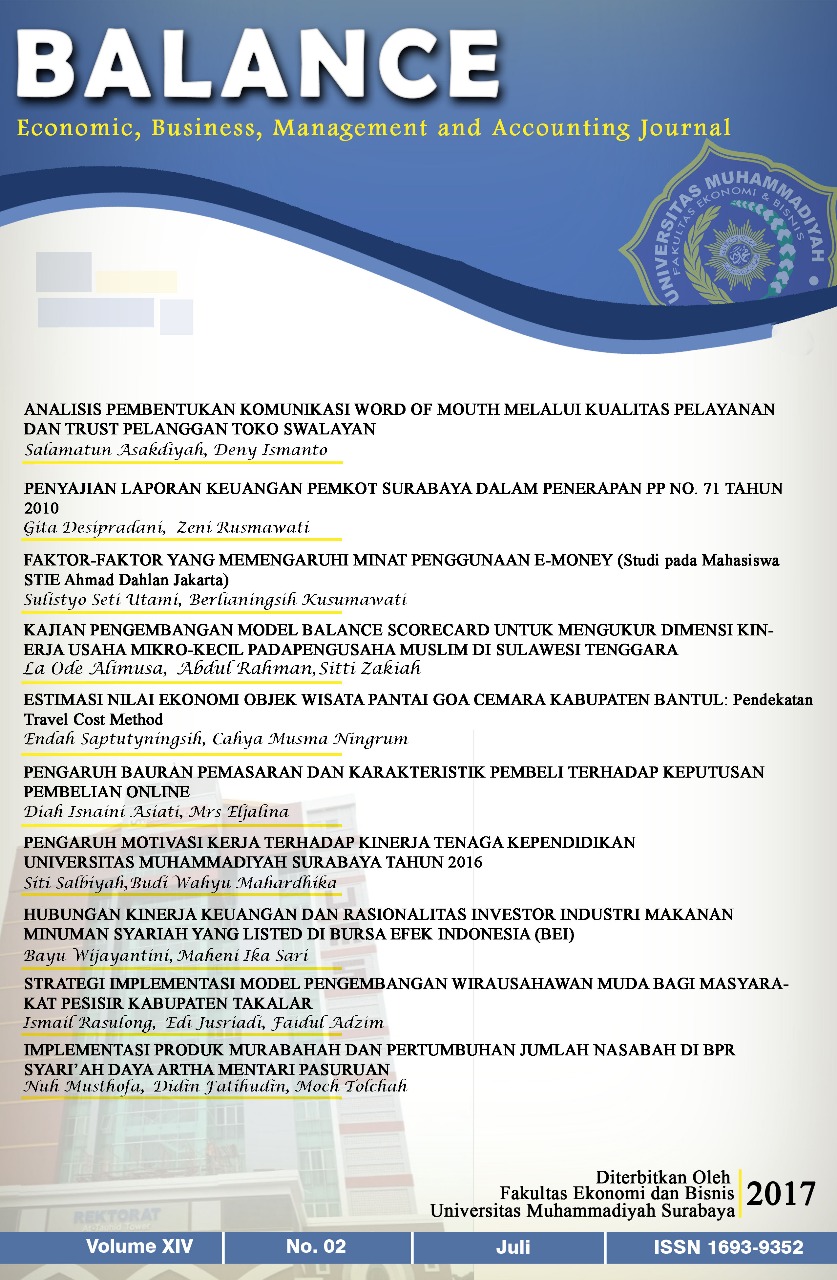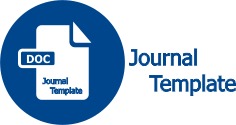KAJIAN PENGEMBANGAN MODEL BALANCE SCORECARD UNTUK MENGUKUR DIMENSI KINERJA USAHA MIKRO-KECIL PADAPENGUSAHA MUSLIM DI SULAWESI TENGGARA
DOI:
https://doi.org/10.30651/blc.v14i02.1277Abstract
ABSTRACTÂ
 The purpose of this study is to determine the determinants of dimensions (factor) business performance of Muslim entrepreneurs in Southeast Sulawesi in running a sustainable and competitive advantages. The specific objective is to find a model of alternative business performance measurement of Muslim entrepreneurs which is the development model of Balance Scorecard implementation (BSC) by incorporating the factors of shariah (worship and lawful approach). The method used in this research is Exploratory Factor analysis and qualitative analysis. Sampling method is non-probability sampling with sample size of 10 x 12 variables = 120 sample members (Roscue approach in Sugiyono: 2012). Methods of data collection using in-depth interviews and questionnaires as well as secondary data. Based on the the results of research and discussion it can be concluded that there are 3 main factors that form the dimensions of micro-small business performance is integrated business strategy factors, Internal Business Targets & External Encouragement and Islamic Business Practice Factor. these three dimensions can shape the performance of small micro-enterprises in Muslim entrepreneurs in Southeast Sulawesi about 65%. Thus the integration of the business orientation with the material approach to business practices based on muamalah principles in Islam (Halal orientation and worship) can improve the performance of competitive and sustainable SMEs.
Keywords                 : Business Performance Dimension, development of BSC model, Muslim Entrepreneurs
Correspondence to      : lalimusa@gmail.com, rahmanfisip@gmail.com, stzakiah132@gmail.com
References
Abdul Wahab, Kalsom dan Rafiki, Ahmad. 2014. Measuring Small Firm Entrepreneur’s Performance Based on Al-Falah. World Apllied Sciences Journal 29 (12): 1532-1539, 2014.
Alimusa, La Ode. 2015. Analisis Pengaruh Faktor Pembentuk Perilaku (Nasabah) Pengusaha UKM Dalam Penggunaan Pembiayaan Bank Syariah Terhadap Kinerja Usaha UMKM Di Kota Kendari. Jurnal Mega Aktiva FE-Universitas Muhammadiyah Kendari, No. ISSN. 2086-1974 Vol. 16 No. XVI 2015
Christopher (2009) Impact of Microfinance on Small and medium-sized Enterprises in Nigeria. Proceding of 7th International Comference on Inovation and Management, Page 1864-1871.
Faizal, P.R.M, et.,al. 2013. The Entrepreneurs Characteristics from Al-Qur’an and Al-Hadis. International Journal of Trade, Economics and Finance, Vol. 4. No.4 August 2011.
Garg P, Rastogi R (2006). New model of job design: motivating employees’ performance. J. Manage Dev, 25: 572-587. Available: www.emeraldinsight.com.
Ghozali, Imam. 2006. Aplikasi Analisis Multivariate dengan Program SPSS, Cetakan IV. Semarang: Badan Penerbit Universitas Diponegoro.
Ibrahim & Primiana. 2015. Influence Business Environment On The Organization Performance. International Journal Of Scientific & Technology Research, Volume 4, Issue 04, April 2015, ISSN 2277-8616
Ismaeel & Blaim. 2012. Practitioner Contribution toward Applied Islamic Business Ethics: Responsible Halal Business. Journal of Management Development Vol. 31 No. 10, 2012 pp. 1090-1100, www.emeraldinsight.com/0262-1711.htm
Kara, Muslimin. 2013. Kontribusi Pembiayaan Perbankan Syariah terhadap Pengembangan Usaha Mikro Kecil dan Menengah (UMKM) di Kota Makasar. Asy-Syir’ah; Jurnal Ilmu Syari’ah dan Hukum, Vol. 47. No I tahun 2013.
Lingesiya, Y. 2012. Identifiying Factors to Indicate the Business Performance of Small Scale Industries: evidence from Sri Lanka. Global Journal of Management and Business Research, Volume 12 issue 21 version 1.0 year 2012.
Mardhahatillah A & Rulindo R 2008, Building Capacity Of Micro And Medium Enterprises Through Spirituality Training, Islamic Finance For Micro-Medium Enterprise, Islamic Research and Training Institute, Jeddah, Saudi Arabia
Muhenje, et.al,. 2013. Application of Strategic Performance Measures in Small and Medium-Sized Manufacturing Enterprises in Kenya: The Use of the Balanced Scorecard Perspectives. International Journal of Management Sciences and Business Research, 2013, Vol. 2, Issue 6.
Oseni, Umar A., Hasan, M. Kabir and Matri, Dorsaf. 2013. An Islamic Finance Model for The Small and Medium Sized Entreprises in France. JKAU: Islamic econ.,Vol. 26 No. 2, pp: 153-180, 2013/1434 H.
Purwaningsih, Ratna dan Kusuma, Pajar Damar. Analisis Faktor-Faktor yang Mempengaruhi Kinerja Usaha Kecil dan Menengah (UKM) dengan Metode Structural Equation Modeling (studi Kasus pada Industri Kreatif Kota Semarang). Prosiding SNST ke-6 tahun 2015, Fakultas Teknik Universitas Wahid Hasyim Semarang.
Saaid Ali, Abd elrahman Elzahi. 2013. The Challenges of Islamic Trade Finance In Promoting SMEs In IDB Member Countries. Proceedings, 1 st Annual International Interdisciplinary Conference, AIIC 2013, 24-26 April, Azores, Portugal
Samir & Larso. 2011. Identifikasi Faktor-Faktor yang Mempengaruhi Kinerja UKM Catering di Kota Bandung. Jurnal Manajemen Teknologi, volume 10 nomor 2 tahun 2011.
Sattar Abbasi et al. 2010 Welfare and protection model for organizational management: The Islamic perspective. African Journal of Business Management Vol. 4(5), pp. 739-747, May 2010, /www.academicjournals.org/AJBM ISSN 1993-8233.
Setyobudi, Andang. 2007. Peran Serta Bank Indonesia Dalam Pengembangan Usaha Mikro, Kecil dan Menengah ( UMKM ), Buletin Hukum Perbankan dan Kebanksentralan, Volume 5, no. 2, Agustus 2007.
Sinaga, Pariaman. 2004. Balance Scorecard Sebagai Pengukuran Kinerja Koperasi dan UKM, Apa Mungkin?. jurnal infokop, Nomor 25 tahun XX 2004 hal 55-61
Soriano, Domingo Ribeiro. 2010. Management Factors Affecting the Performance of Tecnology Firms. Journal of Business Research 63 (2010) 463-470
Sugiyono. 2012. Metode Penelitian Kuantitatif Kulaitatif dan R & D. Bandung: Alfabeta.
Sulaiman, et.,al. 2014. The Understanding of Islamic Management Practices among Muslim Managers in Malaysia. Asian Social Science; Vol. 10, No. 1; 2014 ISSN 1911-2017 E-ISSN 1911-2025, http://dx.doi.org/10.5539/ass.v10n1p189.
Supranto. 2009. Statistik, Teori dan Aplikasi, Edisi Ketujuh Jilid 2. Jakarta: Penerbit Erlangga
Sriyana, Jaka. 2010. Strategi Pengembangan Usaha Kecil dan Menengah (UKM): Studi Kasus Kabupaten Bantul. Simposium Nasional 2010, Menuju Purworejo Dinamis & kreatif
Widana, Gusti Oka, dkk. 2015. Exploring the Inpact of Islamic Business Etics and Relationship Marketing Orientation on Busines Performance: the Islamic Banking Experience. Asian Academic of Management Journal, Vol. 20 No 1, 1-25, 2015
Widarjono, Agus. 2010. Analisis Statistika Multivariat Terapan, Edisi Pertama. Yogyakarta: UPP STIM YKPN.
Zulkifli, R. Mohamad and Rosli, M. Mohd. 2013. Entrepreneurial Orientation and Business Succes of Malay Entrepreneurs: Religiosity as Moderator. International journal of Humanities and Social Science, Vol. 3 No. 10 [special issue – May 2013]
Undang-Undang Republik Indonesia Nomor 20 Tahun 2008 tentang Usaha Mikro, Kecil dan Menengah















